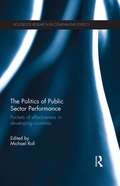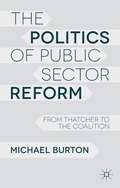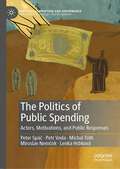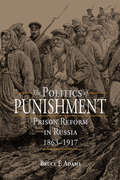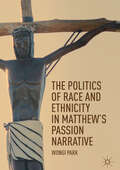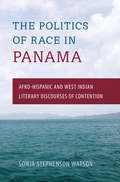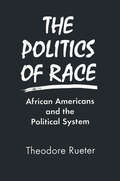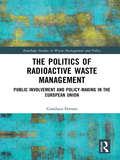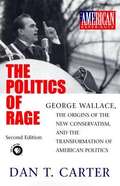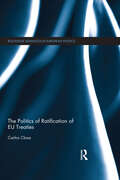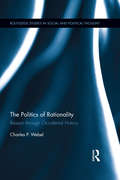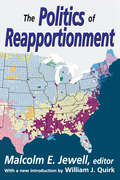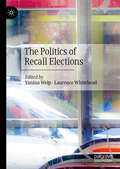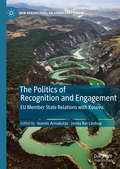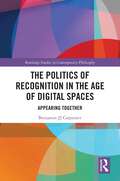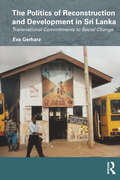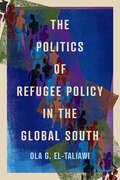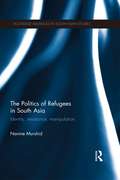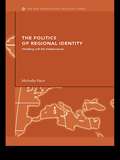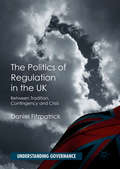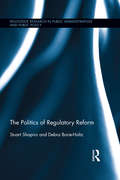- Table View
- List View
The Politics of Public Sector Performance: Pockets of Effectiveness in Developing Countries (Routledge Research in Comparative Politics)
by Michael RollIt is widely believed that the state in developing countries is weak. The public sector, in particular, is often regarded as corrupt and dysfunctional. This book provides an urgently needed corrective to such overgeneralized notions of bad governance in the developing world. It examines the variation in state capacity by looking at a particularly paradoxical and frequently overlooked phenomenon: effective public organizations or ‘pockets of effectiveness’ in developing countries. Why do these pockets exist? How do they emerge and survive in hostile environments? And do they have the potential to trigger more comprehensive reforms and state-building? This book provides surprising answers to these questions, based on detailed case studies of exceptional public organizations and state-owned enterprises in Africa, Asia, the Caribbean, Latin America and the Middle East. The case studies are guided by a common analytical framework that is process-oriented and sensitive to the role of politics. The concluding comparative analysis develops a novel explanation for why some public organizations in the developing world beat the odds and turn into pockets of public sector performance and service delivery while most do not. This book will be of strong interest to students and scholars of political science, sociology, development, organizations, public administration, public policy and management.
The Politics of Public Sector Reform
by Michael BurtonThe first comprehensive 'bird's eye' account of public sector reform supported by references from over 400 official sources, this book is an invaluable guide to all those in the public, private and voluntary sectors grappling with the twin challenges of managing public spending austerity and the pressure in response to transform public services.
The Politics of Public Space in Republican Rome
by Amy RussellTaking public space as her starting point, Amy Russell offers a fresh analysis of the ever-fluid public/private divide in Republican Rome. Built on the 'spatial turn' in Roman studies and incorporating textual and archaeological evidence, this book uncovers a rich variety of urban spaces. No space in Rome was solely or fully public. Some spaces were public but also political, sacred, or foreign; many apparently public spaces were saturated by the private, leaving grey areas and room for manipulation. Women, slaves, and non-citizens were broadly excluded from politics: how did they experience and help to shape its spaces? How did the building projects of Republican dynasts relate to the communal realm? From the Forum to the victory temples of the Campus Martius, culminating in Pompey's great theatre-portico-temple-garden-house complex, The Politics of Public Space in Republican Rome explores how space was marked, experienced, and defined by multiple actors and audiences.
The Politics of Public Space: The Politics Of Public Space And Culture
by Neil Smith Setha LowWhy is public space disappearing? Why is this disappearance important to democratic politics and how has it become an international phenomenon? Public spaces are no longer democratic spaces, but instead centres of private commerce and consumption, and even surveillance and police control. "The Politics of Public Space" extends the focus of current work on public space to include a consideration of the transnational - in the sense of moving people and transformations in the nation or state - to expand our definition of the 'public' and public space. Ultimately, public spaces are one of the last democratic forums for public dissent in a civil society. Without these significant central public spaces, individuals cannot directly participate in conflict resolution. "The Politics of Public Space" assembles a superb list of contributors to explore the important political dimensions of public space as a place where conflicts over cultural and political objectives become concrete.
The Politics of Public Spending: Actors, Motivations, and Public Responses (Political Corruption and Governance)
by Peter Spáč Petr Voda Michal Tóth Miroslav Nemčok Lenka HrbkováThis book provides a comprehensive analysis of the distribution of public money and its political and societal implications. Drawing on evidence from central and eastern Europe, it offers an innovative insight into public responses to various strategies of public spending. Given that public expenditures are funded mainly from tax revenues, it also assesses public attitudes to politically motivated allocations of funds. The book seeks to identify how people evaluate the material benefits of funding in light of the fairness - or lack thereof - of the distribution process, whether popular acceptance of variations in public spending depends on the framing of the beneficiaries, and the implications of money allocation for political trust in political institutions.
The Politics of Punishment: Prison Reform in Russia, 1863–1917 (NIU Series in Slavic, East European, and Eurasian Studies)
by Bruce F. AdamsBruce F. Adams examines how Russia's Main Prison Administration was created, the number of prisoners it managed in what types of prisons, and what it accomplished. While providing a thorough account of prison management at a crucial time in Russia's history, Adams explores broader discussions of reform within Russia's government and society, especially after the Revolution of 1905, when arguments on such topics as parole and probation boiled in the arena of raucous public debate.
The Politics of Race and Ethnicity in Matthew’s Passion Narrative
by Wongi ParkIn Matthew’s passion narrative, the ethnoracial identity of Jesus comes into sharp focus. The repetition of the title “King of the Judeans” (ὁ βασιλεὺς τῶν Ἰουδαίων) foregrounds the politics of race and ethnicity. Despite the explicit use of terminology, previous scholarship has understood the title curiously in non-ethnoracial ways. This book takes the peculiar omission in the history of interpretation as its point of departure. It provides an expanded ethnoracial reading of the text, and poses a fundamental ideological question that interrogates the pattern in the larger context of modern biblical scholarship. Wongi Park issues a critique of the dominant narrative and presents an alternative reading of Matthew’s passion narrative. He identifies a critical vocabulary and framework of analysis to decode the politics of race and ethnicity implicit in the history of interpretation. Ultimately, the book lends itself to a broader research agenda: the destabilization of the dominant narrative of early Christianity’s non-ethnoracial origins.
The Politics of Race and Ethnicity in the United States
by Sherrow O. PinderThe purpose of this book is to examine and analyze Americanization, De-Americanization, and racialized ethnic groups in America and consider the questions: who is an American? And what constitutes American identity and culture?
The Politics of Race and Ethnicity in the United States: Americanization, De-Americanization, and Racialized Ethnic Groups, Updated Edition
by Sherrow O. PinderThe purpose of this book is to examine and analyze Americanization, De-Americanization, and racialized ethnic groups in America and consider the questions: who is an American? And what constitutes American identity and culture?
The Politics of Race in Panama: Afro-Hispanic and West Indian Literary Discourses of Contention
by Sonja S. Watson"Delves into the historical convergence of peoples and cultural traditions that both enrich and problematize notions of national belonging, identity, culture, and citizenship."--Antonio D. Tillis, editor of Critical Perspectives on Afro-Latin American Literature "With rich detail and theoretical complexity, Watson reinterprets Panamanian literature, dismantling longstanding nationalist interpretations and linking the country to the Black Atlantic and beyond. An engaging and important contribution to our understanding of Afro-Latin America."--Peter Szok, author of Wolf Tracks: Popular Art and Re-Africanization in Twentieth-Century Panama "Illuminates the deeper discourse of African-descendant identities that runs through Panama and other Central American countries."--Dawn Duke, author of Literary Passion, Ideological Commitment: Toward a Legacy of Afro-Cuban and Afro-Brazilian Women Writers This volume tells the story of two cultural groups: Afro-Hispanics, whose ancestors came to Panama as African slaves, and West Indians from the English-speaking countries of Jamaica and Barbados who arrived during the mid-nineteenth and early-twentieth centuries to build the railroad and the Panama Canal. While Afro-Hispanics assimilated after centuries of mestizaje (race mixing) and now identify with their Spanish heritage, West Indians hold to their British Caribbean roots and identify more closely with Africa and the Caribbean. By examining the writing of black Panamanian authors, Sonja Watson highlights how race is defined, contested, and inscribed in Panama. She discusses the cultural, racial, and national tensions that prevent these two groups from forging a shared Afro-Panamanian identity, ultimately revealing why ethnically diverse Afro-descendant populations continue to struggle to create racial unity in nations across Latin America and the Caribbean. Sonja Stephenson Watson is director of the Women’s and Gender Studies Program and associate professor of Spanish at the University of Texas at Arlington. A volume in the series Latin American and Caribbean Arts and Culture, funded by the Andrew W. Mellon Foundation.
The Politics of Race: African Americans and the Political System
by Theodore RueterA study of the relationship between race and American politics, organised around the institutions and processes of American government. It includes readings by individuals like Bill Clinton, Charles Hamilton, and Carol Swain, across a wide variety of ideological perspectives.
The Politics of Radioactive Waste Management: Public Involvement and Policy-Making in the European Union (Routledge Studies in Waste Management and Policy)
by Gianluca FerraroEnvironmental concerns have pushed the decarbonisation of the European economy high on the EU political agenda. This has renewed old debates about the role of nuclear energy in the European economy and society that gravitate around the issues of nuclear safety and radioactive waste management (RWM). RWM carries many elements of technical complexity, scientific uncertainty and social value, which makes policy decisions highly controversial. Public participation is usually believed to improve these decisions, ease their implementation by solving substantial conflicts, and enhance trust and social acceptance. Drawing upon sources including Euratom and the OECD Nuclear Energy Agency, the author offers a detailed overview of public involvement in RWM in the EU, analysing the implementation of national policies through official programmes and the views of stakeholders from all Member States. This book highlights the key successes and challenges in the quest for greater participation in RWM, and extrapolates insights for other contested energy infrastructures and controversies in land use. This book will be of great relevance to students, scholars and practitioners with an interest in radioactive waste management, energy policy, and EU environmental politics and policy.
The Politics of Rage: George Wallace, the Origins of the New Conservatism, and the Transformation of American Politics
by Dan T. CarterCombining biography with regional and national history, Dan T. Carter chronicles the dramatic rise and fall of George Wallace, a populist who abandoned his ideals to become a national symbol of racism, and later begged for forgiveness. In The Politics of Rage, Carter argues persuasively that the four-time Alabama governor and fourtime presidential candidate helped to establish the conservative political movement that put Ronald Reagan in the White House in 1980 and gave Newt Gingrich and the Republicans control of Congress in 1994. In this second edition, Carter updates Wallace's story with a look at the politician's death and the nation's reaction to it and gives a summary of his own sense of the legacy of "the most important loser in twentieth-century American politics."
The Politics of Ratification of EU Treaties (Routledge Advances in European Politics)
by Carlos ClosaSince its inception, the European Union (EU) has revised its foundational treaties several times, resulting in national ratification processes involving different actors, with varying success. This book focuses on the politics of ratification of EU Treaties and reviews the processes of ratification of EU primary legislation. Existing research and academic debate on EU constitutional politics have almost exclusively focussed on negotiation of new treaties and their institutional setting. However, this book explains how the result of ratification was achieved, and analyses the strategy that actors pursue across Europe. Ratification of the Treaty of Maastricht and the EU Constitution failed totally, whilst other ratification can be considered partial failures such as the Irish Nice and Lisbon referendums. As the EU Constitution has proved, the ratification process may have deep effects unforeseen during the processes of negotiation. In recent years, ratification has produced some of the most intense debates on national membership of the EU and the EU itself. The Politics of Ratification of EU Treaties will be of interest to students and researchers of European Studies, European Union studies, European Union Law and European Union Politics.
The Politics of Rationality: Reason through Occidental History (Routledge Studies in Social and Political Thought)
by Charles WebelWhat are reason and rationality? How significant are recent postmodernist and neuroscientific challenges to these longheld notions? Should we abandon a belief in reason and an adherence to rationality? Or can reason and rationality be reformulated and reframed? And what does politics have to do with how we think about reason and why we act more or less rationally? The Politics of Rationality differs from other books with "reason" or “rationality” due to its historical, political, depth-psychological, and multidisciplinary approach to understanding reason through history. Charles P. Webel eloquently clarifies the links among ideas, their creators, the relevant mental processes, and the political cultures within which such important concepts as reasons and rationality take hold. He demonstrates how reason and rationality/irrationality have become what they mean for us today and proposes a way to rethink reason and rationality in light of the withering critiques leveled against them. In doing so, he presents a "history of reason and rationality" by examining the intellectual and political contexts of four representative theorists of reason and rationality-- Plato, Machiavelli, Kant, and Weber—and by addressing contemporary challenges posed by postmodernism, depth psychology, and neurophilosophy.
The Politics of Reapportionment
by Malcolm E. JewellThe issue of apportionment is one of the most important problems facing citizens of most of the states in America. It underlies many other problems of state government. Growing judicial concern with apportionment is evidence of a failure of the political process in many states. A political solution to the problem requires better understanding and more accurate information about apportionment, which may be found in The Politics of Reapportionment.Understanding the politics of apportionment may be broken down into four parts: What are the political factors that have caused the various states to follow differing courses in apportionment? What are the political consequences of these differences in apportionment? When a legislature is grappling with any reapportionment problem, what roles are played by the various political groups involved? What are the consequences of transferring this controversy out of the legislative arena?Jewell notes that a study of legislative apportionment is essential to an understanding of any representative system of government. In the U.S. the patterns of apportionment have vitally affected the nature of our state and national political institutions, and our political history has been marked by a number of colorful struggles over this issue. For these reasons, American political scientists have devoted more attention to apportionment than to many other problems of government.
The Politics of Recall Elections
by Yanina Welp Laurence WhiteheadThis edited volume presents the first comprehensive analysis of recall processes which have spread globally since the end of the Cold War, and which are now re-configuring the political dynamics of electoral democracy. Drawing on the expertise of country experts, the book provides a coherent and theoretically informed framework for mapping and evaluating this fast-evolving phenomenon. While the existing literature on the subject has so far focused on isolated single-country studies, the collection brings recall experiments to centre stage as it relates them to current crises in the traditional variants of representative democracy. It explains why the spread of recall innovations is set to continue, and to pass a threshold from inattention to urgent engagement. The authors further provide original insights into the rationale for recall, as well as guidance on minimising the accompanying risks.
The Politics of Recognition and Engagement: EU Member State Relations with Kosovo (New Perspectives on South-East Europe)
by James Ker-Lindsay Ioannis ArmakolasThis edited volume explores the different ways in which members of the European Union have interacted with Kosovo since it declared independence in 2008. While there is a tendency to think of EU states in terms of two distinct groups – those that have recognised Kosovo and those that have not – the picture is more complex. Taking into account also the quality and scope of their engagement with Kosovo, there are four broad categories of member states that can be distinguished: the strong and weak recognisers and the soft and hard non-recognisers. In addition to casting valuable light on the relations between various EU members and Kosovo, this book also makes an important contribution to the way in which the concepts of recognition and engagement, and their relationship to each other, are understood in academic circles and by policy makers.
The Politics of Recognition in the Age of Digital Spaces: Appearing Together (Routledge Studies in Contemporary Philosophy)
by Benjamin JJ CarpenterThis book provides a philosophical analysis of the notion of selfhood that underlies identity politics. It offers a unique theory of the self that combines previous scholarly work on recognition and the phenomenology of space. The politics of identity occupy the centre of a contested terrain. Marginalised and oppressed peoples continue to seek the transformation of our shared social world and our political institutions required for their lives to be liveable. Public criticism and academic treatments of identity politics often take a disparaging view that treats it as subordinate to more general political questions about justice and the organisation of society and its institutions. This book argues that these polemics ignore the numerous ways in which all politics is concerned with matters of selfhood and identity. Through a rereading of Hegel’s account of recognition as an ongoing and dynamic process that constitutes the self, it presents selves—and the categories of identity that qualify these selves—as fundamentally conditioned by the environments in which they appear before themselves and others. It also argues that we do the work of identity in public spaces—particularly digital spaces—and that these spaces shape what identities we can assume and what those identities mean. Contemporary social media technologies facilitate the production of particular forms of selfhood through the combined logics of the interface, the profile, and the post. The Politics of Recognition in the Age of Digital Spaces will be of interest to scholars and advanced students working in a wide range of disciplines including political philosophy, phenomenology, philosophy of technology, sociology, political theory, and critical theory. It will also appeal to anyone with an interest in contemporary identity politics, whether as a matter of study or lived experience.
The Politics of Reconstruction and Development in Sri Lanka: Transnational Commitments to Social Change (Routledge/Edinburgh South Asian Studies Series)
by Eva GerharzSri Lanka’s conflict and peace processes have gained global attention during recent years. This book presents a comprehensive insight into the politics of reconstruction and development in Sri Lanka, focussing on the ceasefire which was negotiated between the Government of Sri Lanka and the separatist Liberation Tigers of Tamil Eelam in 2002 and which lasted until 2006. Based on extensive empirical fieldwork, the book provides a unique ethnographic account of this specific historical period of peace. It explains how development was shaped by interplay and cooperation, but also by the disparities and conflicts between a variety of local and intervening actors, including local organizations and civil society, LTTE, Government of Sri Lanka, international development cooperation and the Tamil diaspora. Starting from an interdisciplinary viewpoint, the author integrates findings from development sociology with new perspectives on transnationalization and the migration-development-nexus. This provides a fine grained analysis of the emerging development visions and perspectives in relation to transnationalization and global interconnectedness. Making an innovative contribution by linking the analysis of local reconstruction with contemporary phenomena of transnationalization, diasporization, and globalization, this book will appeal to those with an interest in Sociology, Social Anthropology and Political Science.
The Politics of Refugee Policy in the Global South (McGill-Queen's Refugee and Forced Migration Studies #15)
by Ola G. El-TaliawiMass refugee movements represent a complex policy problem to host governments as they challenge existing socio-economic and political structures. While scholarship on refugee migration tends to centre on the Global North, most refugees actually reside in the Global South, where the capacity to provide assistance is limited.Shifting the focus from sensationalist rhetoric about mass migration to the North, The Politics of Refugee Policy in the Global South provides a comparative analysis of Lebanon’s and Jordan’s responses to the Syrian refugee movement, one of the largest displacements in modern history. Through extensive interviews and process tracing, Ola El-Taliawi uncovers the complex realities of refugee hosting and the hard choices governments make in light of this challenge. Building on the concept of complexity, El-Taliawi employs a unique methodology and analytical approach, painting a nuanced picture of asylum provision and identifying a spectrum of refugee hosting models.More than ever, we need a better understanding of the unique politics of refugee policymaking in the Global South. This incisive book offers key insights for effective governance and reform of the global refugee regime.
The Politics of Refugees in South Asia: Identity, Resistance, Manipulation (Routledge Advances in South Asian Studies)
by Navine MurshidPartition and post-colonial migrations – sometimes voluntary, often forced – have created borders in South Asia that serve to oppress rather than protect. Migrants and refugees feel their real home lies beyond the border, and liberation struggles continue the quest for freedoms that have proven to be elusive for many. States scapegoat refugees as "outsiders" for their own ends, justifying the denial of their rights, while academic discourse on refugees represents them either as victims or as terrorists. Taking a stance against such projections, this book examines refugees’ struggles for better living conditions and against marginalization. By analyzing protest and militarization among refugees, the book argues that they are neither victims without agency nor war entrepreneurs. Through interviews, surveys, and statistical analyses, it shows how states have manipulated refugee identity and resistance to promote the ideal of the nation-state, thereby creating protracted refugee crises. This is evident even in the most humanitarian state intervention in modern South Asia – India’s military intervention in East Pakistan (now Bangladesh) in 1971. The findings put forward provide the basis to understand the conditions under which violence can break out, and thereby have implications for host countries, donor countries, and aid organizations in the formulation of refugee‐policy. The book is of interest to scholars in the fields of South Asian studies, comparative politics, international relations, refugee studies, development studies, security studies and peace studies.
The Politics of Regional Identity: Meddling with the Mediterranean (New International Relations)
by Michelle PaceA keen analysis of the impact of European regionalism in the Mediterranean, focusing on the politics of representation and constructions of identity.The Mediterranean - as a region, as an area of EU policy and as a place on the fringe of a rapidly integrating Europe - has been a theoretically under-researched area. Containing empirical research on Greece, Malta and Morocco, this theory-led investigation into the political effects of the Mediterranean's symbolic geography, complements work done on the constitution of entities such as nations, Europe and the West. The Politics of Regional Identity draws on the field of critical IR and critical geopolitics to examine both the theoretical and empirical manifestations of these changing geopolitical images and discourses. This book will be of great interest to all students and scholars of politics, international relations and the European Union.
The Politics of Regulation in the UK
by Daniel FitzpatrickThis book explores the discourse of regulatory crisis in the UK and examines why, despite the increasing contestation of the principles underpinning the regulatory state, its institutions and practices continue to be firmly embedded within the governance of the British state. It considers its implications for our understanding of the contemporary nature of the British state, and to the study of regulation which is no longer confined to the domain of low politics, populated by technocrats, but is scrutinised by elected politicians, and the subject of the front pages rather than the financial pages. The author sets the British regulatory tradition in a wider context, both spatially, in terms of the challenges presented by Europeanisation, and temporally, critically analysing the process of crisis construction in the narratives of neoliberalism and participatory democracy in the contemporary era.
The Politics of Regulatory Reform (Routledge Research in Public Administration and Public Policy)
by Stuart Shapiro Debra Borie-HoltzRegulation has become a front-page topic recently, often referenced by politicians in conjunction with the current state of the U.S. economy. Yet despite regulation’s increased presence in current politics and media, The Politics of Regulatory Reform argues that the regulatory process and its influence on the economy is misunderstood by the general public as well as by many politicians. In this book, two experienced regulation scholars confront questions relevant to both academic scholars and those with a general interest in ascertaining the effects and importance of regulation. How does regulation impact the economy? What roles do politicians play in making regulatory decisions? Why do politicians enact laws that require regulations and then try to hamper agencies abilities to issue those same regulations? The authors answer these questions and untangle the misperceptions behind regulation by using an area of regulatory policy that has been underutilized until now. Rather than focusing on the federal government, Shapiro and Borie-Holtz have gathered a unique dataset on the regulatory process and output in the United States. They use state-specific data from twenty-eight states, as well as a series of case studies on regulatory reform, to question widespread impressions and ideas about the regulatory process. The result is an incisive and comprehensive study of the relationship between politics and regulation that also encompasses the effects of regulation and the reasons why regulatory reforms are enacted.
